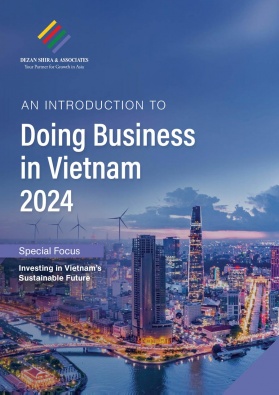Prospects for Environmental Technology Investors in Vietnam
Vietnam’s commitment to sustainable development and achieving net-zero (carbon emission) goals offers significant opportunities for environmental technology innovation and foreign investment.
As the world grapples with the escalating challenges of climate change, Vietnam could emerge as a leader in sustainable development.
Leveraging its strategic location, abundant natural resources, and supportive government policies, Vietnam can become a pioneer in environmental technologies. By transitioning to green policies and fostering a collaborative approach, Vietnam is poised to lead the way in environmental sustainability.
We discuss key considerations in this op-ed.
What is environmental technology?
Environmental technology, also known as green or clean technology, encompasses a broad spectrum of tools and practices aimed at mitigating the environmental impact of human activity. This field includes advancements in energy, transportation, agriculture, and waste management, all striving for a sustainable and eco-friendly future. Technologies such as electric vehicles, solar panels, and wind energy represent significant strides towards building a more sustainable world.
Vietnam’s potential in harnessing environmental technology
Vietnam is rapidly becoming a prime destination for sustainable investments, attracting foreign investors with favorable policies and increasing public demand for eco-friendly practices.
Green investment in Vietnam focuses on projects that reduce carbon emissions, enhance energy efficiency, and develop sustainable infrastructure.
Vietnam’s green growth journey
Vietnam has integrated green growth into its national strategies and action plans, achieving significant milestones:
- Environmental benefits: Increased forest cover, improved air quality, and a slower rate of greenhouse gas emissions growth.
- Economic opportunities: Investments in renewable energy, sustainable agriculture, and eco-tourism, creating economic opportunities and green jobs.
- International reputation: Attracting foreign investments and partnerships, with notable foreign direct investment (FDI) in green sectors.
Risks and challenges
Vietnam faces potential economic and social risks due to climate change, with costs projected to range between 12 percent and 14.5 percent of GDP annually by 2050. It is estimated that one million people could face acute poverty by 2030 as a result of climate impacts.
Commitment to net-zero emissions
At COP28, Prime Minister Pham Minh Chinh reaffirmed Vietnam’s commitment to achieving net-zero emissions by 2050. The Vietnam business community and foreign investors are eagerly anticipating robust sustainability policies to drive collaboration towards a sustainable economy. The government has so far released national action plans focusing on air quality, water conservation, and plastic waste pollution, underscoring the urgency of transitioning from “the red carpet” to “the green carpet” to ensure a sustainable future.
Transition from a ‘Red Carpet’ to ‘Green Carpet’ approach
Vietnam’s initial economic reform strategy, known as the red carpet approach, successfully attracted investors with various incentives. This strategy has positioned Vietnam as a top FDI destination in ASEAN, attracting approximately US$455 billion in registered FDI by September 2023. However, this approach now faces challenges:
- Global minimum tax (GMT): Reducing the appeal of current tax incentives.
- Internal economic changes: Declining advantages of a young workforce and affordable labor costs.
- Climate change and consumer behavior: Growing consumer concerns over environmental issues compel manufacturers to adopt sustainable practices.
The green carpet strategy promotes sustainable policies and solutions to attract high-quality investments, focusing on fostering innovative and knowledge-based industries.
Policy components
Electricity supply and renewable energy
Ensuring a stable electricity supply and integrating renewable energy sources is crucial for Vietnam’s sustainable development. Implementing the Direct Power Purchase Agreement (DPPA) will facilitate the direct purchase of electricity from renewable sources, promoting cleaner energy consumption.
The development of green industrial zones, supported by Decree 35/2022/ND-CP, aims to encourage the establishment of eco-friendly industrial zones and convert existing parks into ecological zones.
The Vietnamese government has approved the National Energy Master Plan (NEMP) through Decision Number 893/QD-TTg for the 2021-2030 period, with a vision extending to 2050. The NEMP broadly aims to:
- Ensure national energy security
- Reduce carbon emissions to meet Vietnam’s commitment to net-zero by 2050
- Ensure the energy industry is independent and self-sufficient
The plan projects that Vietnam will produce enough energy to support an economy growing at 7 percent per annum between now and 2030, and 6.5 percent to 7.5 percent between 2031 and 2050.
To achieve these ambitious goals, it is estimated that Vietnam will require up to VND 4,808 trillion (US$203 billion) in investment capital between 2021 and 2030. Additionally, a further VND 14,590 trillion (US$615 billion) will be needed between 2031 and 2050, totaling VND 19,398 trillion (US$818 billion).
Environmental, social, and governance (ESG) standards
The Vietnam ESG Initiative is among key efforts to support the implementation of Vietnam’s Green Growth Strategy for the period 2021-2030 and Decision 167/QD-TTg 2022. This initiative results from collaboration between the United States Agency for International Development (USAID) and the Agency for Enterprise Development (AED) under the Ministry of Planning and Investment (MOPI). Its goal is to facilitate private sector involvement in promoting sustainable and inclusive growth.
Embracing ESG and sustainable practices will enable businesses to seize new opportunities in the context of the green transition and enhance their competitiveness in the global supply chain.
Role of central and local government in institutional framework and policies
- Vietnam Environment Administration (VEA): Under the Ministry of Natural Resources and Environment (MONRE), VEA issues regulations, standards, and permits, and performs inspections. MONRE oversees air pollution, water resource management, and waste problems.
- Ministry of Construction (MOC): Responsible for the Water Supply and Sewerage Law, promoting modern infrastructure development.
- Ministry of Public Security (MOPS): Ensures enforcement of environmental protection laws.
- Ministry of Industry and Trade (MOIT): Issues industry-specific regulations and conducts inspections.
Scope for sustainability investment
Water supply and wastewater treatment
Agriculture and aquaculture are vital economic pillars for Vietnam as it progresses toward becoming an industrialized nation by 2045, a goal set by the government. Currently, Vietnam is a leading exporter of products such as rice, coffee, pepper, nuts, shrimp, and catfish. With a population exceeding 98 million, it is projected that by 2030, half of the population will reside in urban areas.
The country’s intensive agricultural activities, rapid growth in industrial sectors such as metallurgy, garment, paper, dairy, and furniture, along with fast-paced urbanization, necessitate urgent sustainable water resource management. In 2020, Vietnam’s water consumption was 3.6 billion cubic meters for municipal activities, 7.5 billion cubic meters for industry, and 94 billion cubic meters for agriculture. Forecasts indicate these figures will rise to 5.7 billion cubic meters, 15.6 billion cubic meters, and 103 billion cubic meters respectively by 2030.
Currently, only 15 percent of Vietnam’s wastewater is collected and treated. A substantial amount of wastewater from residential areas, animal husbandry, and various small and medium-sized economic activities is discharged into the environment without proper treatment. According to ICHAM, Vietnam is among the top five countries that discharge the largest amount of water into the sea after China, Indonesia, Thailand, and the Philippines. Additionally, municipal solid waste is a significant contributor to underground water pollution in Vietnam.
As per a 2022 Ministry of Natural Resources and Environment report, wastewater treatment mechanisms in industrial parks have improved and 91 percent of industrial parks in Vietnam have a centralized system. Yet, as ICHAM notes, these parks often lack standard or have inefficient wastewater treatment systems in place leading to poor outcomes were companies treat wastewater arbitrarily or discharge directly impacting nearby ecosystems. Key challenges to meet environmental targets include low investment capital and limited financial capacity that hinders infrastructure development in some localities, business lack of awareness of environmental damage,
The industrial wastewater treatment sector is dominated by domestic enterprises and joint ventures with foreign companies. Key players include Envico, Envitech, Navitechco, Tam Nhin Xanh, SEEN Technologies Corp., and Ecoba ENT. By 2022, 50 wastewater treatment plants with a total design capacity of approximately 1.8 million cubic meters per day were planned, with 80 percent utilizing activated sludge technology. However, this technology faces challenges in control and optimization, requiring large construction areas and bio-energy. In contrast, developed countries use AOP, nanotechnology, and biodegradation to treat persistent pollutants, save electricity, optimize treatment processes, and reuse water resources.
Air pollution control
The increasing regulatory stringency and need for pollution control technologies present opportunities for foreign companies, particularly in the industrial sectors.
Solid waste management
There is a growing market for advanced waste treatment technologies and systems, driven by increasing waste generation and inadequate existing infrastructure.
Environmental consulting and engineering
Demand is rising for environmental impact assessments, pollution control technologies, and advanced engineering services to address Vietnam’s environmental challenges.
Renewable sector opportunities
Vietnam has significant potential to generate 160 gigawatts of electricity from renewable energy sources, including solar, wind, and hydropower, according to a 2019 McKinsey report. This potential offers numerous investment opportunities for foreign investors in Vietnam’s transition to clean energy.
Solar energy investments
Vietnam’s tropical climate, with an average solar irradiation of 5 kWh/m² per day, is ideal for solar energy projects. Prime locations such as Binh Thuan, Ninh Thuan, and Tay Ninh receive the highest solar radiation levels in the country, making them suitable for large-scale solar farms.
Wind energy investments
With a coastline of over 3,000 kilometers, Vietnam has excellent conditions for both onshore and offshore wind farms. Regions like Binh Dinh, Quang Tri, and Gia Lai are particularly attractive for wind energy investments due to their consistent and strong wind speeds.
Hydropower investments
Vietnam is rich in rivers suitable for hydropower, including the Mekong, Red, and Song Ma rivers. Regions such as Lao Cai, Son La, and Thanh Hoa have already seen significant hydropower development due to their abundant river resources and high rainfall.
Overall, Vietnam’s abundant natural resources and favorable conditions create a promising landscape for renewable energy investments, driving the nation’s transition to sustainable and clean energy.
Leading companies and initiatives
- Dragon Capital Group: Invested over US$1 billion in renewable energy projects through its Renewable Energy Fund II.
- LEGO Group: Building a carbon-neutral facility with solar panels in Vietnam-Singapore Industrial Park.
- Google and Facebook: Investing in renewable energy projects and data centers powered by renewable energy. Google has a solar power plant in Ninh Thuan province.
- Samsung: Constructing a solar-powered factory for green manufacturing.
Conclusion
Vietnam’s commitment to green growth and clean energy to address power shortages, coupled with its rapid economic development and favorable investment environment, presents substantial opportunities for investments in environmental technology and sustainable solutions.
Foreign investors can play a crucial role in driving the country towards a more sustainable and environmentally friendly future by leveraging innovative technologies and creating strategic partnerships.
Vietnam’s shift to a “green carpet” investment strategy is essential for maintaining its investment attractiveness and ensuring sustainable development. Success will depend on the government’s ability to remain flexible and adaptive in its policies to allow Vietnam to be competitive and align with global trends.
About Us
Vietnam Briefing is published by Asia Briefing, a subsidiary of Dezan Shira & Associates. We produce material for foreign investors throughout Asia, including ASEAN, China, and India. For editorial matters, contact us here and for a complimentary subscription to our products, please click here. For assistance with investments into Vietnam, please contact us at vietnam@dezshira.com or visit us at www.dezshira.com.
Dezan Shira & Associates assists foreign investors throughout Asia from offices across the world, including in Hanoi, Ho Chi Minh City, and Da Nang. We also maintain offices or have alliance partners assisting foreign investors in China, Hong Kong SAR, Dubai (UAE), Indonesia, Singapore, Philippines, Malaysia, Thailand, Bangladesh, Italy, Germany, the United States, and Australia.
- Previous Article EuroCham Vietnam’s Business Confidence Index for Q2 2024
- Next Article FDI, Export Targets to Propel Sustainability Adoption in Vietnam’s Garment and Textile Sector
































